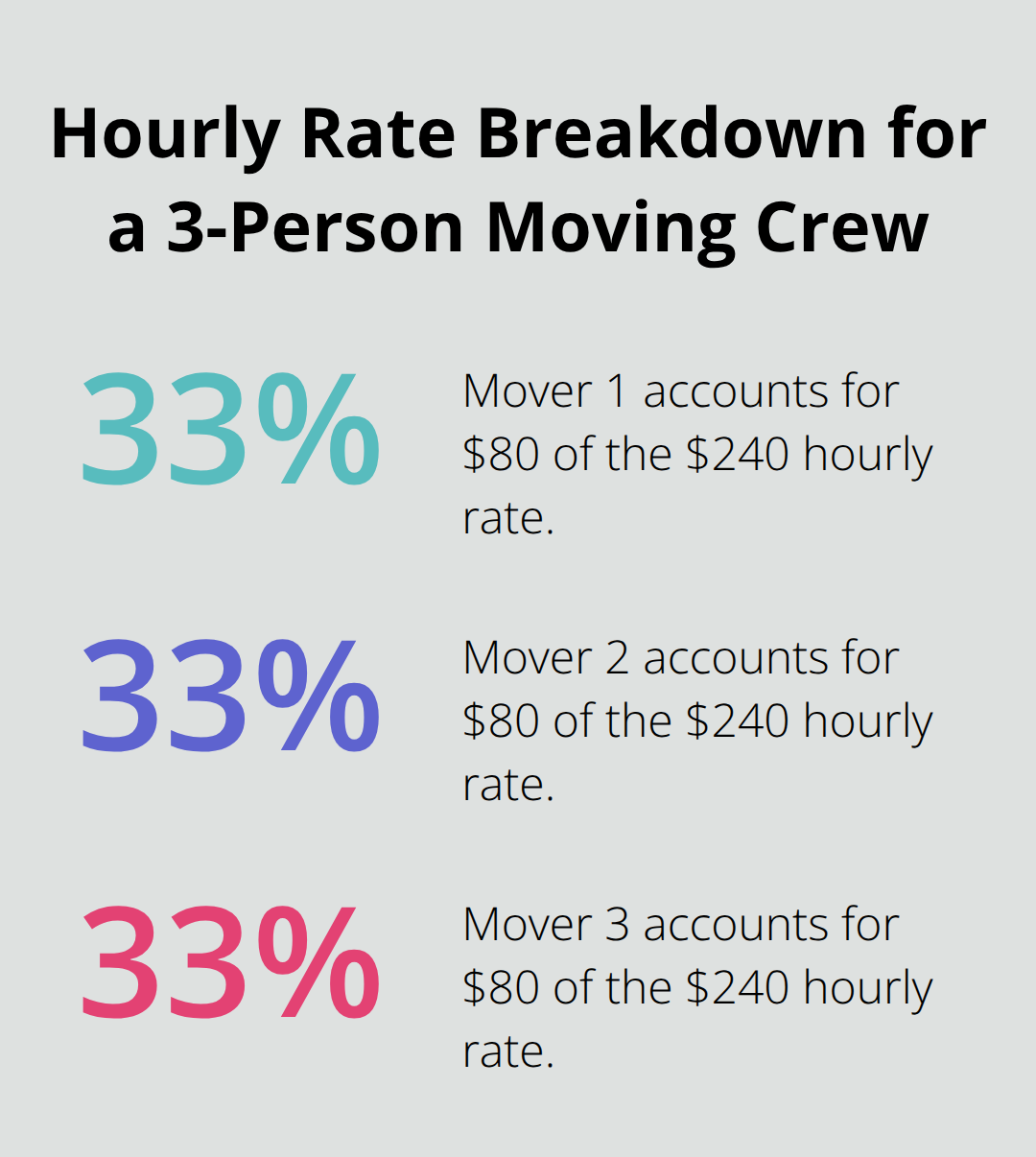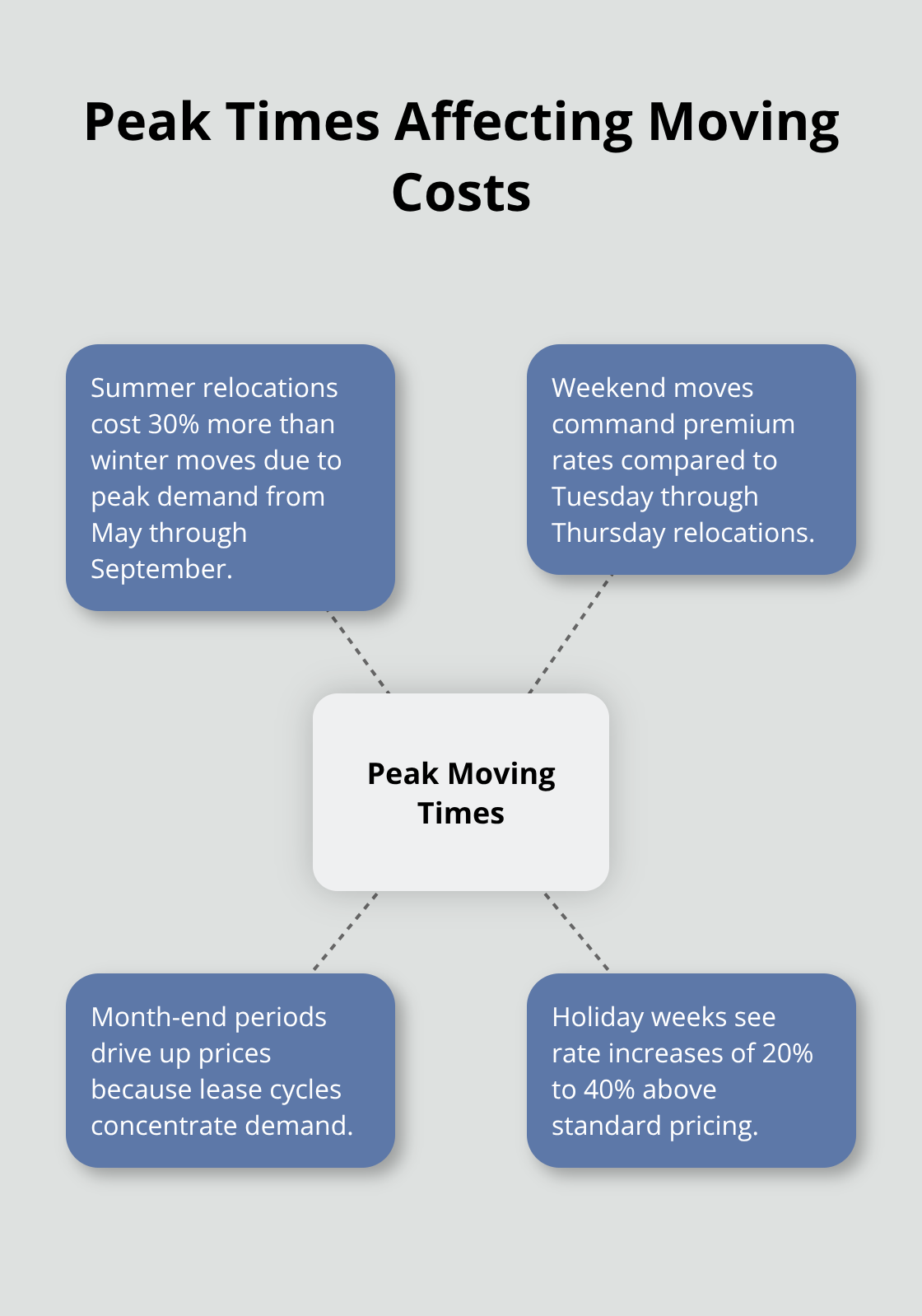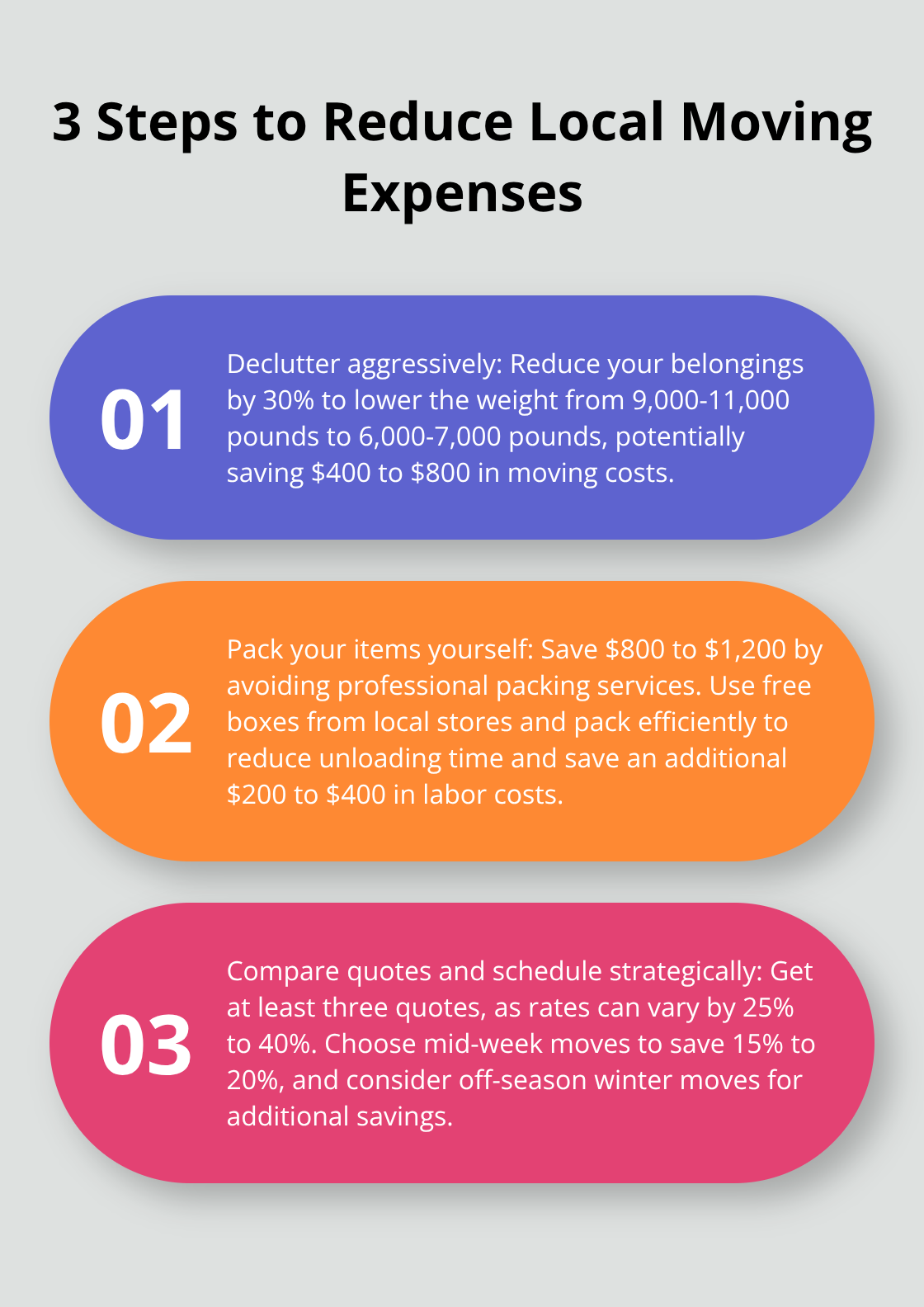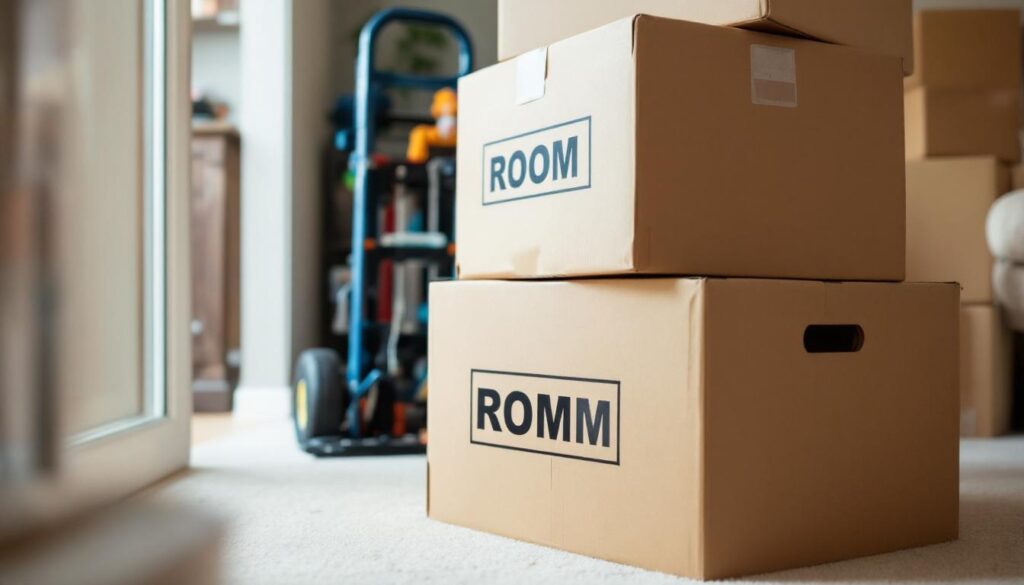Moving a 3-bedroom house locally typically costs between $800 and $2,500, depending on several key factors. The average cost to move a 3-bedroom house locally varies significantly based on distance, services needed, and timing.
We at Southbay Moving Systems see homeowners frequently underestimate these expenses. Understanding the true cost breakdown helps you budget effectively and avoid surprise charges on moving day.
Average Cost Breakdown for Local 3-Bedroom House Moves
Hourly Rates Reveal the True Numbers
Local moving companies charge between $100 and $200 per hour for a standard 3-person crew. Professional movers price their services at about $80 per hour per mover, which means a three-person team costs around $240 hourly. Most 3-bedroom moves require 7 to 10 hours of work, which pushes total labor costs between $1,680 and $2,400. Companies often enforce minimum charges of 3 to 4 hours, even for smaller jobs.

Distance and Complexity Determine Total Costs
Moves within a 20-mile radius typically cost around $2,000 for a standard 3-bedroom house. Moves under 50 miles range from $1,350 to $3,300, while moves within the same city average $1,479 according to industry data. Complex moves that involve stairs, narrow hallways, or difficult parking add 20% to 30% to base rates. Heavy items like pianos incur additional charges from $100 to $2,000 (depending on instrument type and access challenges).
Additional Fees Accumulate Quickly
Fuel surcharges and equipment fees represent 20% of total moving costs on average. Moving companies charge extra for long carries that exceed 75 feet from truck to door, stair fees for each flight, and disassembly of large furniture. Packing supplies cost $200 to $500 when you purchase them through movers. Basic valuation coverage provides limited protection, which makes full-value insurance worth consideration at 1% to 2% of belongings value.
Peak Season Pricing Affects Your Budget
Summer months drive up moving costs due to higher demand for services (May through September represents peak season). Moving companies charge premium rates during weekends and month-end periods when most people relocate. Off-peak winter moves can save you 20% to 30% compared to summer rates. Mid-week moves typically cost less than weekend relocations, which gives you flexibility to reduce expenses through strategic timing.
These cost factors directly connect to several variables that can either increase or decrease your final bill, which we’ll examine next.
Factors That Impact Your Moving Costs
Item Weight and Volume Set Base Pricing
Moving companies calculate costs primarily through weight and volume of your belongings. A typical 3-bedroom house contains 9,000 to 11,000 pounds of items, which affects both truck size requirements and crew effort. Furniture density matters significantly – solid wood pieces cost more to move than lightweight alternatives. Heavy appliances like refrigerators and washers add $50 to $150 each in handling fees. Moving companies charge extra for items that exceed 200 pounds, which includes most bedroom sets and dining room tables. With 12.1% of Americans moving in 2023, decluttering before your move directly lowers transportation costs.
Distance Within Your City Multiplies Expenses
Local moves under 10 miles average $1,200 to $1,800 for 3-bedroom houses, while moves that span 20 to 50 miles jump to $2,000 to $3,300. Travel time between locations affects hourly charges because crews remain on the clock during transit. Moves that cross county lines within your metropolitan area incur additional permits and fees. Traffic conditions during your move day impact total hours worked – rush hour relocations cost 15% to 20% more due to extended travel times. Accessibility challenges at either location add surcharges, with narrow streets or limited parking that increase costs by $200 to $500.
Peak Times Control Your Final Bill
Summer relocations cost 30% more than winter moves due to peak demand from May through September. Weekend moves command premium rates compared to Tuesday through Thursday relocations. Month-end periods drive up prices because lease cycles concentrate demand. Holiday weeks see rate increases of 20% to 40% above standard pricing. Weather delays during winter months can extend job duration but lower base rates often compensate for potential complications. Professional packing services add $800 to $1,200 but reduce move duration by 2 to 3 hours (sometimes offsetting labor savings).

Additional Services Add Unexpected Costs
Specialty items require extra handling that increases your bill substantially. Piano moves alone can cost $100 to $2,000 depending on instrument type and access challenges. Packing supplies purchased through movers cost $200 to $500, while basic valuation coverage provides limited protection. Full-value insurance costs 1% to 2% of belongings value but offers comprehensive coverage for repairs and replacements. Storage services during transition periods add monthly fees that range from $50 to $300 based on unit size and location.
Smart planning around these cost factors can significantly reduce your expenses, which leads us to proven strategies that help you save money on your local move.
Ways to Reduce Your Local Moving Expenses
Declutter Aggressively Three Months Before Your Move
Moving companies charge based on weight and distance, which makes aggressive decluttering your most powerful cost-cutting tool. Sell or donate 30% of your belongings before moving day to reduce truck size requirements and labor hours significantly. Heavy furniture pieces like old dressers and entertainment centers cost $50 to $150 each in handling fees, so you eliminate these expenses when you remove these items. Hold garage sales six weeks before your move to recover some furniture value while you reduce moving weight.
Donate clothing, books, and household items to local charities for tax deductions that offset moving expenses. The average 3-bedroom house contains 9,000 to 11,000 pounds of items, but strategic decluttering can reduce this to 6,000 to 7,000 pounds and drop your total costs by $400 to $800.
Pack Your Items to Eliminate Labor Charges
Professional packing services cost $800 to $1,200 for 3-bedroom homes, but self-packing cuts this expense entirely. Start packing non-essential items eight weeks before moving day to avoid last-minute stress and rushed decisions. Use free boxes from liquor stores, grocery chains, and online marketplaces instead of purchasing supplies from moving companies (at $200 to $500).
Pack room by room and label boxes clearly with contents and destination rooms to speed up the unloading process. Moving companies charge hourly rates between $100 and $200, so efficient packing that reduces unloading time saves $200 to $400 in labor costs.

Compare Multiple Quotes and Schedule Strategically
Request quotes from at least three companies because rates vary by 25% to 40% between providers. Mid-week moves cost 15% to 20% less than weekend relocations, which gives you immediate savings through smart scheduling. Winter moves between November and March can save you hundreds compared to peak summer rates (when demand peaks from May through September).
Book your move during off-peak hours when possible, as morning starts typically cost less than afternoon appointments. Flexible scheduling allows moving companies to offer better rates when they fill gaps in their schedules.
Final Thoughts
The average cost to move a 3-bedroom house locally ranges from $800 to $2,500, with most homeowners who pay around $2,000 for moves within 20 miles. Your final bill depends heavily on distance, schedule, and additional services that you require. Weight and volume of belongings drive base rates, while peak season moves from May through September cost 30% more than winter relocations.
Smart budgets account for hourly rates between $100 and $200, plus additional fees that represent 20% of total costs. Declutter before your move and pack items yourself to save $800 to $1,200 in expenses (strategic schedule choices during off-peak times reduce costs by 15% to 20%). Multiple detailed quotes protect you against surprise charges that appear on moving day.
We at Southbay Moving Systems provide transparent rates for your local relocation needs. Professional movers offer accurate estimates that account for all potential fees. This approach helps you budget effectively for your upcoming move.




